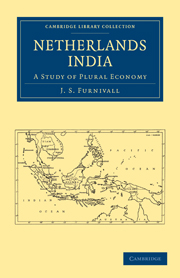Book contents
- Frontmatter
- INTRODUCTION
- Contents
- TERRITORIAL DIVISIONS
- NETHERLANDS INDIA
- AUTHOR'S PREFACE
- LIST OF GENERAL REFERENCES
- GLOSSARY
- MEASURES AND CURRENCY
- THE MALAY ARCHIPELAGO, IN COMPARISON WITH EUROPE
- Chapter I INDONESIA, TO 1600
- Chapter II THE EAST INDIA COMPANY, 1600–1800
- Chapter III THE YEARS OF CONFUSION, 1795–1815
- Chapter IV THE YEARS OF UNCERTAINTY, 1815–1830
- Chapter V THE CULTURE SYSTEM, 1830–1850
- Chapter VI THE TRANSITION TO LIBERALISM, 1850–1870
- Chapter VII LIBERALISM, 1870–190
- Chapter VIII EFFICIENCY, WELFARE AND AUTONOMY
- Chapter IX ADMINISTRATIVE AND POLITICAL REFORMS
- Chapter X ECONOMIC PROGRESS
- Chapter XI SOCIAL ECONOMY
- Chapter XII SOME EFFECTS OF THE CRISIS OF 1929
- Chapter XIII PLURAL ECONOMY
- INDEX OF REFERENCES
- GENERAL INDEX
Chapter III - THE YEARS OF CONFUSION, 1795–1815
Published online by Cambridge University Press: 07 September 2010
- Frontmatter
- INTRODUCTION
- Contents
- TERRITORIAL DIVISIONS
- NETHERLANDS INDIA
- AUTHOR'S PREFACE
- LIST OF GENERAL REFERENCES
- GLOSSARY
- MEASURES AND CURRENCY
- THE MALAY ARCHIPELAGO, IN COMPARISON WITH EUROPE
- Chapter I INDONESIA, TO 1600
- Chapter II THE EAST INDIA COMPANY, 1600–1800
- Chapter III THE YEARS OF CONFUSION, 1795–1815
- Chapter IV THE YEARS OF UNCERTAINTY, 1815–1830
- Chapter V THE CULTURE SYSTEM, 1830–1850
- Chapter VI THE TRANSITION TO LIBERALISM, 1850–1870
- Chapter VII LIBERALISM, 1870–190
- Chapter VIII EFFICIENCY, WELFARE AND AUTONOMY
- Chapter IX ADMINISTRATIVE AND POLITICAL REFORMS
- Chapter X ECONOMIC PROGRESS
- Chapter XI SOCIAL ECONOMY
- Chapter XII SOME EFFECTS OF THE CRISIS OF 1929
- Chapter XIII PLURAL ECONOMY
- INDEX OF REFERENCES
- GENERAL INDEX
Summary
1. The Revolution. In 1795 the constitution of the United Provinces, designed originally to maintain a balance of power between rival States leagued against a common enemy, had come to represent a balance of privilege between the Stadhouder and the hereditary civic aristocracy, the Regents. But during the eighteenth century the Republic, which had withstood the arms of France, surrendered to its culture, its musicians and dancing-masters, cooks, barbers and philosophers. Montesquieu, with his clear and logical doctrine of the division of power between Legislature, Executive and Judiciary, lighted up the shadows of the unwieldy constitution; Voltaire taught men to scoff at privilege, and Rousseau proclaimed the sovereignty of the people. Under the impact of these ideas the age-long struggle between Stadhouder and Regents took a fresh turn, and a new party, claiming to be Patriots, further complicated civic strife by introducing a democratic element, which inclined alternately to one side or the other, and opposed the privileges of both.
The Patriots, though disunited, were agreed on preferring France to England, whereas the Stadhouder, William V, had English sympathies, and, as the outcome of a disturbance in 1787, many Patriots had to seek refuge in France. Among these was Daendels, who was destined to imprint his strong personality on Java. In 1792, when the Jacobins declared war on the United Provinces, Dumouriez, accompanied by Daendels at the head of a Batavian Legion, proclaimed that he was coming to help the Dutch shake off the yoke of Orange;“we shall pass through your rich provinces” he said, “as friends and brothers”.
- Type
- Chapter
- Information
- Netherlands IndiaA Study of Plural Economy, pp. 54 - 79Publisher: Cambridge University PressPrint publication year: 2010First published in: 1939



